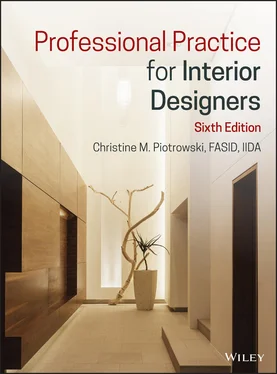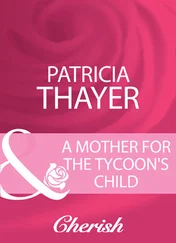Christine M. Piotrowski - Professional Practice for Interior Designers
Здесь есть возможность читать онлайн «Christine M. Piotrowski - Professional Practice for Interior Designers» — ознакомительный отрывок электронной книги совершенно бесплатно, а после прочтения отрывка купить полную версию. В некоторых случаях можно слушать аудио, скачать через торрент в формате fb2 и присутствует краткое содержание. Жанр: unrecognised, на английском языке. Описание произведения, (предисловие) а так же отзывы посетителей доступны на портале библиотеки ЛибКат.
- Название:Professional Practice for Interior Designers
- Автор:
- Жанр:
- Год:неизвестен
- ISBN:нет данных
- Рейтинг книги:4 / 5. Голосов: 1
-
Избранное:Добавить в избранное
- Отзывы:
-
Ваша оценка:
- 80
- 1
- 2
- 3
- 4
- 5
Professional Practice for Interior Designers: краткое содержание, описание и аннотация
Предлагаем к чтению аннотацию, описание, краткое содержание или предисловие (зависит от того, что написал сам автор книги «Professional Practice for Interior Designers»). Если вы не нашли необходимую информацию о книге — напишите в комментариях, мы постараемся отыскать её.
Professional Practice for Interior Designers
Professional Practice for Interior Designers — читать онлайн ознакомительный отрывок
Ниже представлен текст книги, разбитый по страницам. Система сохранения места последней прочитанной страницы, позволяет с удобством читать онлайн бесплатно книгу «Professional Practice for Interior Designers», без необходимости каждый раз заново искать на чём Вы остановились. Поставьте закладку, и сможете в любой момент перейти на страницу, на которой закончили чтение.
Интервал:
Закладка:
Most interviews in interior design are not designed to induce stress. As best as you can relax and enjoy the opportunity to talk to the employer. Focus on your qualifications in terms of what you can do for the company. Graduating students need to indicate a willingness to learn. Be enthusiastic in your answers, and stress your positive characteristics.
The Interview Discussion
The interview discussion itself will include several themes. First, the employer will ask you questions to see if you fit with the needs of the company. The employer will be looking for various clues in your answers and demeanor to help with the hire/no hire decision. Second, you will have the opportunity to present your portfolio. Naturally, this is your chance to convince the employer that you have the skills to work at the company and do the job that is available. Third, you will have the opportunity to ask questions of the employer to help you determine if this is the firm you want to work for, clarify responsibilities, and acquire other information that is important to you.
Your preparation has you comfortable to answer the questions posed by the employer. Try to be calm and confident. You know who you are and what you can do. Now is your time to convince the employer. More will be discussed about interview questions in the next section.
During your interview, never bring up personal problems, argue, blame others, or beg for the job. Even if you left your previous job under difficult circumstances, do not blame anyone at the other company for your problems. This tags you as a difficult person. If you are asked if you were ever fired, be honest. Make some brief comments about what happened and hope the interviewer moves on.
Be well prepared in presenting your portfolio. Don't rush through this presentation, but also don't spend an inordinate amount of time on each item. Don't make excuses or apologize for work that is less than perfectly executed. Poor‐quality work should not have been included. Don't forget to clarify what part of a group project you did when presenting work that is not totally your own.
One very good clue that the employer is interested in you is if the interviewer suggests showing you around the studio or office. This is usually done only if the candidate interests the employer and she wants to introduce you to staff members. However, if you have not actually been offered the position, don't assume anything. Every once in a while, an employer just tries to be nice and shows off the studio but doesn't offer you a job.
On the other hand, if you realize that you are not interested in working for the company, you need to complete the interview but promptly inform the firm that you are not interested. Students should not accept an interview if you really have no interest in working for the company. Some students like to go on interviews to “practice” for the job they want. This is poor business etiquette that can come back to haunt you later.
For the most part, if you are offered a position, be prepared either to accept or reject it at that time. If you are offered a position that is different from the one you expected or you are being offered a lower salary than you were expecting, it is acceptable to ask for time to consider the offer. If you really want the position, say so. Do not leave without knowing what the salary range is if you have been given an offer.
It is very common for a firm to interview several people for even an entry‐level position. If you are not made an offer but there is no indication that you have been rejected, ask the interviewer when he will be ready with a decision. This will help you decide about making other interview appointments or making a decision about another offer.
Watch for clues that the interview is drawing to a close. A few common ones are the interviewer begins to stack the job application, your resume, and his notes together; or the interviewer pushes his chair back in preparation for getting up. This is the time to summarize your interest in the position and why you are the best candidate. State this in a few sentences so that you do not overstay your welcome at the end. When the interview is over, get up and leave promptly.
If an offer is made and you accept it, be sure that you understand what day you are to start, the time, and anything else that you need to take care of, either prior to your first day or during your first day on the job. If you don't get an offer, you will probably be disappointed, but you still need to be gracious and professional. Say something that indicates you are interested in the job if you really are. It is important to keep a good attitude at this point because needs change in interior design all the time. The firm that doesn't need you today may have work come in that requires hiring additional staff next week. Don't forget to thank the interviewer for his time, regardless of the outcome.
TYPICAL INTERVIEW QUESTIONS
There are many kinds of questions that are commonly asked in interviews. Interviewers will ask questions to find out about your personality and demeanor. They want to determine whether you will fit into the existing group. They will ask questions to determine your overall interest in interior design and the specialty area that you are interested in pursuing. If you are a recent graduate, the interviewer probably will ask you about your educational background and the classes you took.
Typically, an employer will ask you to discuss your strengths and weaknesses. Whenever possible, discuss your strengths related to specific examples. Perhaps CAD is a particular strength, so consider mentioning grades in those classes or extra workshops you have taken. Weaknesses are harder to discuss. Deal with any of these in a straightforward manner, focusing on how you are trying to overcome the weakness.
Questions are likely to come up to find out about your ambitions in the field and, to some degree, your future plans with regard to your career. Interviewers may even ask questions to find out if you have any “skeletons in the closet,” to discover whether you left a prior job under bad circumstances. It is important that you prepare yourself for these questions in advance. The questions shown in Table 6‐4are typical of ones asked in an interior design interview.
TABLE 6‐4. Common interview questions
| General Questions for Any Candidate |
| Why did you decide to become an interior designer? |
| What do you know about our company? |
| How did you hear about our company? |
| Why do you wish to work for us? |
| Have you applied to any other companies? |
| Tell me about the qualifications you have for this position. |
| Are you willing to do the traveling out of town that is necessary for this position? |
| Tell me about yourself. |
| How long have you lived in this city? |
| How much compensation are you expecting? |
| What will you add to our company? |
| Describe what you consider to be your weaknesses. |
| How do you plan to overcome those weaknesses? |
| Could you name a coworker we could contact who could tell us something about you? |
| Do you have any objections to taking a psychological test? |
| Questions Common for Entry‐Level Positions |
| Why did you select the college or school you attended? |
| Why did you select a major in interior design? |
| Did you have any leadership experience in college? |
| How do you think your colleagues in your major would describe you? |
| How do you view this job in relationship to your long‐term goals? |
| Describe your reactions when your work was criticized. |
| What are your ambitions for the future? |
| How long would you expect to stay with our company? |
| Did you find it comfortable to work in the classroom studio? |
| How long do you think it will take you to make a meaningful contribution to our firm? |
| Common Questions for Candidates with Prior Professional Experience |
| Tell me about your previous experience and how those positions relate to this position. |
| How do you think you can best contribute to this firm? |
| Why are you looking for another position? |
| Are you a leader? |
| What are your ambitions for the future? |
| You appear to be overqualified for this job. Why are you applying for this position? |
| If you are offered a position with this company, tell me what you would do during the first month on the job. |
| How much are you worth? |
| How would you describe your supervisory (management) style? |
| How have you increased sales or profits at your present employer? |
| How do you think your present boss would describe you? |
| May we contact your present employer? |
| Please tell me how many days of work you missed last year. |
Your Interview Questions
Интервал:
Закладка:
Похожие книги на «Professional Practice for Interior Designers»
Представляем Вашему вниманию похожие книги на «Professional Practice for Interior Designers» списком для выбора. Мы отобрали схожую по названию и смыслу литературу в надежде предоставить читателям больше вариантов отыскать новые, интересные, ещё непрочитанные произведения.
Обсуждение, отзывы о книге «Professional Practice for Interior Designers» и просто собственные мнения читателей. Оставьте ваши комментарии, напишите, что Вы думаете о произведении, его смысле или главных героях. Укажите что конкретно понравилось, а что нет, и почему Вы так считаете.












